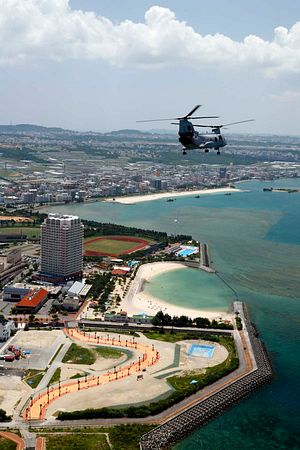On May 19, a former U.S. Marine who works as a civilian employee at a U.S. base in Okinawa was arrested by Okinawa Prefectural Police. He was charged with the murder and desertion of the remains of Rina Shimabukuro, a 20-year old woman in Okinawa.
Following the incident, a predictable sequence of the events unfolded. The commanding general of U.S. Forces in Okinawa and the U.S. consul general apologized to Okinawan Governor Takeshi Onaga. Japanese Defense Minister Gen Nakatani summoned U.S. Ambassador Caroline Kennedy and officially protested the crime that was committed. Prime Minister Shinzo Abe spoke of the intention of his government to strongly request the U.S. government to take appropriate measures to prevent the recurrence of such incidents. Understandably, there has been a surge in protests in Okinawa, demanding all U.S. bases be closed.
There is no question that what happened is tragic and the crime that has been committed was malicious. It has been reported that the suspect confessed that he had been driving around with a purpose of sexually assaulting a woman. Worse yet, he allegedly murdered her and deserted her body. From all accounts, it was an inexcusable, despicable act.
That said, it is disheartening to see a simplistic, predictable blame-game unfolding between two groups. On the one hand, there are those who take every incident and crime—no matter how serious or minor—as the proof of absolute negative effects of hosting U.S. bases in Japan. On the other hand, there are those who simply push the geostrategic logic of why U.S. forward-stations its bases, personnel, and their families in Japan, the overwhelming part of which is concentrated in Okinawa. Grounded in completely different perspectives with so little room to compromise, these two groups are unable to have constructive dialogue.
Reportedly, some government officials are said to have lamented that this arrest was “bad timing,” referring to the fact that it came shortly before President Barack Obama arrives in Japan. It was also reported that the Japanese government and the ruling Liberal Democratic Party of Japan (LDP) are concerned about the backlash that this arrest might cause to the upcoming Upper House election in July. This is an example that demonstrates the disconnect between the two group in its worst form—while such concerns are justified at the policymaking level, it is an extremely poor initial reaction by the government that lacks compassion for the public’s concerns. Such a response only aggravates the anger of the victim’s families, the victims of similar crimes in the past, and the community that hosts U.S. bases.
The difficult and inconvenient reality is that hosting U.S. forward-deployed forces has always brought both positives and negatives in Japan. On the positive side, almost all of those who are stationed in Japan develop a lifelong affinity toward the country. Their experiences in Japan are often enriched by the friendships they nurture with the Japanese they come into contact with, either through work and/or in the community live in.
At the same time, the U.S. troop presence in Japan inevitably has a negative side. Crimes committed by U.S. servicemembers and other U.S. employees top the list of such negatives, followed by other misbehaviors and noise pollution as well as other inconveniences from the training and operation of U.S. forces. What is challenging about the crimes committed by U.S. servicememembers stationed in Japan is that it is simply impossible to eliminate them. There will always be those stationed in Japan who will misbehave. The best that can be done by the authorites is to ensure that those U.S. military personnel that misbehave or worse, commit crimes, will be promptly arrested and held accountable.
Indeed, particularly since the 1995 rape of a school girl in Okinawa, the U.S. and Japanese governments have worked hard to improve mechanisms to minimize the negative impact of U.S. bases. Moreover, the United States has repeatedly demonstrated that its defense establishment has taken concerns expressed by the Japanese local community seriously. In response to this most recent crime, Secretary of Defense Ashton Carter has told his Japanese counterpart that the U.S. government hopes that “the perpetrator of this crime will be held accountable under the Japanese legal system,” suggesting that Washington will not request extradition of the suspect to the United States. While this suspect is not an active U.S. servicemember and therefore is not covered by the Status of Forces Agreement (SOFA) provisions between the United States and Japan, Carter’s statement still sends an important signal to those stationed in Japan of the potential consequence of their gross misbehavior.
Geostrategically, the U.S. forward military presence in Japan continues to serve as the anchor for U.S. power projection in the Asia-Pacific region, providing the bedrock of stability in the regional security environment. With the security concerns in the region, such as North Korea’s nuclear brinksmanship and China’s assertive behavior in maritime Asia, showing no sign of going away, the demand for the U.S. military’s continuous engagement in this region will only grow in the coming years. In such an environment, the strategic importance of U.S. forces in Japan is likely to increase, rather than diminish.
The recent arrest in Japan is yet another example of the complex challenges that the U.S. and Japan need to continue to address so that the U.S. force presence in Japan, whatever form it ultimately takes, will be both operationally effective as well as politically sustainable.

































